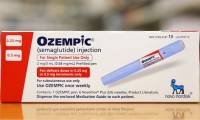-
Novo Nordisk, Eli Lilly face injury lawsuit from user of popular GLP-1 medicines
- Source: drugdu
- 117
- August 7, 2023
-
FDA warns patients about compounded versions of Novo Nordisk’s Ozempic, Wegovy
- Source: drugdu
- 172
- June 2, 2023
-
Pfizer oral weight loss drug may be as effective as Ozempic injection by Novo Nordisk, study says
- Source: drugdu
- 149
- May 24, 2023
-
In heavyweight obesity fight, Eli Lilly launches Mounjaro head-to-head trial against Novo Nordisk’s Wegovy
- Source: drugdu
- 133
- April 25, 2023
-
Novo Nordisk’s weight loss drug semaglutide found to improve wellbeing
- Source: drugdu
- 460
- May 17, 2021
-
Novo Nordisk’s Sogroya moves closer towards EU approval
- Source: drugdu
- 259
- February 5, 2021
-
Novo Nordisk’s new-generation basal insulin Tresiba® approved in China
- Source: Novonordisk
- 544
- September 29, 2017
-
The world’s first, created in China! Weekly insulin preparation Novozyme® debuts at CIIE, to be launched at the end of the month
- Source: drugdu
- 56
- November 8, 2024
-
EMA backs Wegovy cardiovascular label update as Novo seeks EU coverage
- Source: drugdu
- 93
- July 29, 2024
-
FTC Seeks More Information on the $16.5B Novo-Catalent Deal, Leading to Another Delay
- Source: drugdu
- 134
- May 8, 2024
your submission has already been received.
OK
Subscribe
Please enter a valid Email address!
Submit
The most relevant industry news & insight will be sent to you every two weeks.













